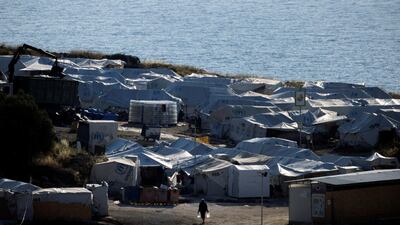Charities working in Greek migrant camps are urging Germany to take in more refugees, saying that the sites lack facilities and are overcrowded.
"Germany means the prospect of security and a future for all the people it takes in, especially for children," the charities said.
The statement was signed by groups including Amnesty International, Save the Children, Medecins Sans Frontieres, and the leading religious and social organisations Caritas and Diakonie, as EU ministers met on Tuesday.
"There are still many more, particularly vulnerable people seeking protection in the refugee camps on the Greek islands, that Germany can – and must – help," the statement said.
"Despite substantial cash payments and aid deliveries, living conditions for refugees in hot spots on the Greek islands remain dire – both in terms of conditions for having their applications accepted and access to the asylum system," the groups said.
The statement said the Greek camps lack appropriate housing, medical aid and educational facilities.
The human rights organisations also criticised worsening conditions on the EU's external border, which they said make asylum applications more difficult.
Greece is one of the EU countries in southern Europe on the front line of receiving new migrants.
Rich countries in northern Europe have long been under pressure to accept more migrants, partly to ease the responsibility of the southern nations and partly to allow migrants to start their new lives sooner.
Ministers from Cyprus, Greece, Spain, Italy and Malta on Tuesday indicated they were willing to support a temporary deal strengthening the EU's asylum agency that could pave the way for a breakthrough on handling migrants.
In April, Germany ended a relocation programme that last year allowed about 2,700 migrants from Greek camps to enter the country.
Germany is one of 16 EU countries involved in taking in refugees from Greece.
The Federal Office for Migration and Refugees said Germany had received 67,646 applications for asylum since January 1, of which 443 had been accepted.

A further 11,317 people were recognised as refugees and more than 14,700 applications were rejected, German data shows.
The UN High Commission for Refugees says an estimated 9,400 people are living in camps on the northern Aegean islands.
Of these, more than 6,000 live in the main refugee camp on Lesbos, which was quickly rebuilt after a fire last year.
The EU agreed to fund five new Greek refugee camps, but the plan was met with resistance from residents.
Ylva Johansson, the EU Home Affairs Commissioner, said on a visit to Greece on Monday that the EU would provide €250 million ($293.3m) to create five camps on the islands of Lesbos, Samos, Chios, Kos and Leros.
Greece’s Migration Minister Notis Mitarachi said a new migrant reception centre on Lesbos should be open by the winter, while others on Samos and Kos would be ready within three months.












